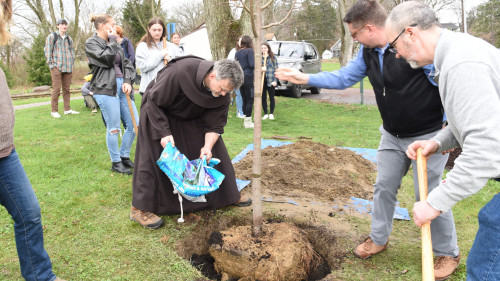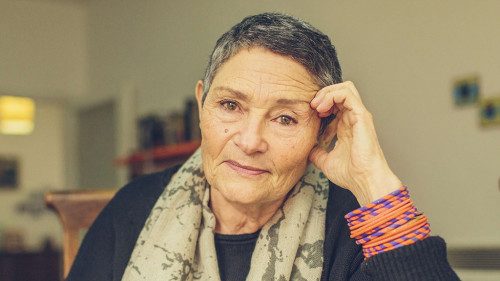
- As a child, I was very entrepreneurial. By age six, I was delivering newspapers to 55 homes/daily, and 80 on Sunday. By age 10, I had two friends working for me doing lawn care, and removal of leaves (fall) and snow (winter). At age 17, I was hired by the newspaper company to become a bill collector, a horrible job since I had to threaten people, even those living on limited pensions, to pay their bill.
- My first plane ride from Indianapolis to St. Louis was on a 50-seat twin-prop airplane during my senior year in high school. I noticed that no one was sitting in the front of the plane while the back section was full. I decided to take a seat in first class not realizing that these seats came with a price. The flight attendant asked to see my ticket and then ‘graciously’ informed me that my seat was in the back of the plane. I tried to convince her that the plane risked being off balanced, but she was not convinced. Talk about being put in your place!
- Hoping to become a lawyer, I registered at the local branch of Indiana University in Indianapolis, a small campus of 18,000 at that time. In my first semester, I took a course in psychology with over 300 students. The class met in a large auditorium and was run by two teaching assistants. I never met the professor. I disliked the course so much I stopped going to class and did not even bother to withdraw from the class. The result: my first and only failing grade in my entire educational career. Sound familiar?
- Before Habitat for Humanity came on the scene, the Franciscans were engaged in rebuilding homes for the aged, widows/widowers, and the poor in the Appalachian region of West Virginia. A religious sister who taught me music in grade school asked me to play the guitar for a Mass celebrated in the basement of a Methodist Church by a Franciscan friar. Besides the friar, I was the only other Catholic. Everyone else was Methodist. Later that year, I went with the Methodist youth to Appalachia to rebuild homes for the poor while staying at a Franciscan retreat center. Talk about a confusing vocational calling to become a Franciscan: Methodist youth; an ‘ecumenical-minded’ friar; and the gracious poor in Appalachia. God works in mysterious ways!
- During my graduate studies as a Franciscan living in Chicago, I spent a week on the streets of Chicago living like street people, well, almost like them. I took $5 in cash and my photo ID and checked into a well-known hotel – well known to the poor because it cost only $3/night for a cage-like room with a cheap padlock on the makeshift door. After checking in, I met a young guy my age from somewhere in Ohio. He invited me to go for a beer, but I told him I had only $2, not enough to buy one beer. “Don’t worry about it,” he told me. “I will pay for your beer tonight. Tomorrow, you are coming with me, and we will work for eight hours, and you will have plenty of money to buy me beer.” The next day, he knocked on the door at 4:00 a.m. to go to work. We loaded heavy boxes from trucks to conveyor belts Monday to Friday. By the end of the week, I had over $300 in cash. Each evening, we went to a different soup kitchen where we were able to eat for free the entire week. The only expenses: $3 per day for a room, and another $10 for beers. Talk about “God taking care of fools!”
- One afternoon while walking on a main street in Kinshasa, the capital city of the Democratic Republic of Congo where I conducted field studies in partial completion of my Ph.D. in religious anthropology (University of Birmingham, UK), a Toyota light-duty truck containing a contingent of heavily armed soldiers dressed in civilian attire pulled beside me and a Congolese friend. They ordered us to hand over our identification cards and to do as they instructed. Without speaking a word, I walked away from them. One of the people ordered me more than once to stop and threatened to shoot me. I kept walking. My Congolese friend did as the men ordered. They repeatedly ordered me to stop. I kept walking. Soon, I turned back and saw no soldiers. My friend was walking casually towards me. “What did they want?” I asked. “They wanted money, as always,” he responded. I asked him, “How much did you give them?” “Nothing! I told them you were a member of the Green Beret and had a bad attitude and they better not mess with you. They let me go and took off as quickly as they arrived.” We both laughed.
- One day while working at the Catholic Bishops’ office in Washington, D.C., I received a call from a member of the National Security Council (NSC) working in the White House. He asked to meet me at an out of the way coffee shop to talk about a very urgent matter. After ordering coffee, the man immediately went to the point of our meeting. “The President is asking you for a special favor. Could you speak to an African archbishop and ask him if he would be willing to run for president of his country. He will have the full support of the U.S. government and the president.” What do you say to such a request? I informed my boss at the Bishops’ Conference and, in a limousine ride from the airport to the White House, I conveyed the message to the archbishop. During the meeting between the archbishop and the head of the NSC, not a word was mentioned about the U.S. offer. On the way to the place where the archbishop was staying, he told me to inform the NSC that he was grateful for the visit and discussions, and for their offer but he was not interested. “I am a man of God, not of politics,” the archbishop told me. The following morning, I received a call from the same man who invited me out for coffee. I informed him of the archbishop’s decision not to accept the president’s offer. I felt like I was in a 007 movie!
- What do a hotel in Washington, D.C. a famous singer, and a Franciscan working to address the HIV/AIDS crisis in Africa have in common? You got it: Bono of U-2. On two occasions while working on global health issues, I had the opportunity to meet and spend nearly two hours with Bono. His life story is very complex but also very interesting. He told me that success cannot be measured only in terms of gold record awards, unlimited concert appearances, fame, and great wealth. “It is first and foremost a matter of values, of respecting people created in God’s image, and of our responsibility to care for one another, especially those suffering the physical and social consequences of HIV,” he told me. Should we invite Bono to speak at Siena? Let’s take a vote.
- Rare in today’s world are the credible prophetic voices, which remind us that we are not gods; we are dependent and interdependent creatures called to respect and care for one another and for all of creation. I have had the wonderful opportunity of meeting one such prophet of our times, Pope Francis: intelligent; concerned; attentive to the plight of all who suffer; promoter of a new vision of our relationship with and responsibility towards one another and towards the natural world, our fundamental call to love and care for all of God’s creation. As the members of the Board of Trustees and friars alike can attest, Pope Francis is “the real thing.”
- Someone asked me how I got to Siena. I told them I flew to Albany and Fr. Mark picked me up. “No! I mean, why are you here?” My response: “Alaska, the Athabaskan people, lack of salmon in the Yukon River, melting permafrost, and a disproportionate suffering during COVID-19 by the indigenous peoples among whom I spent 2 months.” “Salmon? Permafrost? COVID-19? What have these got to do with me being at Siena?” they asked. You, the reader might be asking the same. Come to the October 10-11, 2024, symposium on sustainability and integral ecology entitled “Earth’s Cry, Humanity’s Call” to find out!

